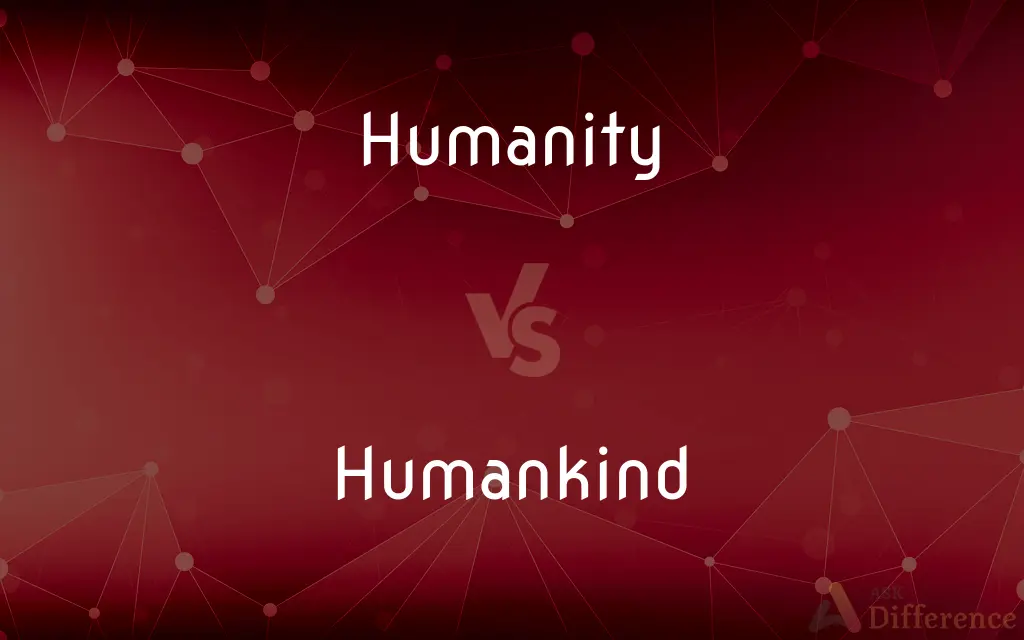Humanity vs. Humankind — What's the Difference?
By Urooj Arif & Maham Liaqat — Updated on March 7, 2024
Humanity and humankind both refer to the human race, but humanity also connotes humaneness and compassion, while humankind strictly denotes the collective human species.

Difference Between Humanity and Humankind
Table of Contents
ADVERTISEMENT
Key Differences
Humanity and humankind are terms that often are used interchangeably to describe the collective species of human beings on Earth. However, the word "humanity" carries an additional connotation of humaneness and the qualities that define the human character, such as compassion, empathy, and the capacity for love. On the other hand, "humankind" refers more strictly to the human species as a whole without implying the moral and ethical aspects that "humanity" suggests.
Discussing the achievements or history of our species, "humankind" is used to emphasize the collective progress and capabilities of humans as a biological entity. This term underscores the evolutionary, social, and technological advances that humans have made over centuries. Whereas "humanity" is often used in contexts that highlight moral, ethical, and emotional development, stressing the importance of qualities like kindness, altruism, and the pursuit of justice.
In literature and philosophy, "humanity" is a term rich with implications about the human condition, exploring what it means to be human beyond mere biological definitions. It delves into themes of existence, consciousness, and the intrinsic value of human life and its relationship with the world. "Humankind," while it can be used in such discussions, tends to keep the focus on the species from a more objective, analytical perspective.
The appeal to "humanity" is common in humanitarian discourse, where the emphasis is on universal human rights, ethical obligations to one another, and the shared dignity that underpins social justice movements. This usage highlights the dual nature of "humanity" as both the collective identity of our species and the ideal of benevolence towards others. Conversely, "humankind" is less likely to be used in these contexts, as it lacks the emotional and ethical weight carried by "humanity."
Although "humankind" and "humanity" can sometimes be used interchangeably when referring to the human species, the choice between them can significantly affect the nuance of the message conveyed. "Humankind" is preferable when the intention is to speak about humans collectively without the additional layers of moral and ethical meaning, while "humanity" is selected to evoke a sense of global kinship and moral responsibility.
ADVERTISEMENT
Comparison Chart
Definition
Refers to the human race, emphasizing qualities like compassion, empathy, and moral values.
Strictly denotes the collective human species without implying moral or ethical qualities.
Connotation
Carries a moral and ethical weight, highlighting the humaneness and benevolence of the human character.
Focuses on the human species from an objective, biological, or social perspective.
Usage in Discourse
Used in humanitarian contexts to evoke a sense of global kinship and moral responsibility.
Used to discuss the collective progress, capabilities, and history of the human species.
Themes in Literature and Philosophy
Explores the human condition, consciousness, and the intrinsic value of human life.
More likely to be used in analytical discussions about humans as a species.
Emotional Weight
Heavy, due to its association with universal human rights, ethics, and social justice.
Neutral, focusing on the species without the added dimension of humaneness or compassion.
Compare with Definitions
Humanity
The quality of being humane; kindness.
Acts of charity are considered true expressions of humanity.
Humankind
The human species; human beings collectively.
Humankind has always been fascinated by the stars.
Humanity
Human nature; the characteristics that make humans human.
Art and culture are vital expressions of humanity.
Humankind
The history and prehistory of the human species.
The invention of the wheel was a pivotal moment for humankind.
Humanity
A subject studying human culture and society.
She has a degree in humanities, focusing on philosophy and history.
Humankind
The totality of human beings.
Climate change poses a significant threat to humankind.
Humanity
Compassion or benevolence toward others.
In times of crisis, we see humanity's capacity for kindness.
Humankind
An objective term for the human species in scientific contexts.
The study examines the evolutionary milestones of humankind.
Humanity
The human race; human beings collectively.
Advances in technology have impacted all of humanity.
Humankind
Refers to all human beings, regardless of gender, race, or age.
Medical advances benefit humankind universally.
Humanity
Humans considered as a group; the human race.
Humankind
The human race
"humankind's God-given creativity" (New York Times).
Humanity
The condition or quality of being human.
Humankind
The human race; mankind, humanity; Homo sapiens.
Humanity
The quality of being humane; benevolence.
Humankind
Mankind.
Humanity
A humane characteristic, attribute, or act.
Humankind
All of the inhabitants of the earth;
All the world loves a lover
She always used `humankind' because `mankind' seemed to slight the women
Humanity
The languages and literatures of ancient Greece and Rome; the classics.
Humanity
Those branches of knowledge, such as philosophy, literature, and art, that are concerned with human thought and culture.
Humanity
; human beings as a group.
Humanity
The human condition or nature.
Humanity
The quality of being benevolent; humane traits of character; humane qualities or aspects.
Humanity
Any academic subject belonging to the humanities.
Philosophy is a humanity while psychology is a science.
Humanity
The quality of being human; the peculiar nature of man, by which he is distinguished from other beings.
Humanity
Mankind collectively; the human race.
But hearing oftentimesThe still, and music humanity.
It is a debt we owe to humanity.
Humanity
The quality of being humane; the kind feelings, dispositions, and sympathies of man; especially, a disposition to relieve persons or animals in distress, and to treat all creatures with kindness and tenderness.
Humanity
Mental cultivation; liberal education; instruction in classical and polite literature.
Polished with humanity and the study of witty science.
Humanity
The branches of polite or elegant learning; as language, rhetoric, poetry, and the ancient classics; belles-letters.
Humanity
All of the inhabitants of the earth;
All the world loves a lover
She always used `humankind' because `mankind' seemed to slight the women
Humanity
The quality of being humane
Humanity
The quality of being human;
He feared the speedy decline of all manhood
Common Curiosities
Can humanity and humankind be used interchangeably?
Yes, they can be used interchangeably when referring to the human species, but the choice of word affects the message's nuance due to the additional connotations of humanity.
How does humankind differ from humanity in literature?
In literature, humankind is used to discuss the human species objectively, while humanity explores deeper themes of human nature, the human condition, and moral and ethical considerations.
Is there a difference in emotional weight between humanity and humankind?
Yes, humanity carries a heavier emotional weight due to its associations with moral values, compassion, and ethical behavior towards others, whereas humankind is more neutral.
What is humankind?
Humankind strictly denotes the human species as a whole, focusing on the collective identity without the moral and ethical implications associated with humanity.
What is humanity?
Humanity refers to the human race, emphasizing moral values like compassion and empathy, and also denotes the qualities that make humans humane.
Why is humanity often associated with moral values?
Humanity is associated with moral values because it encompasses the qualities of being humane, such as kindness, compassion, and empathy, beyond just the biological aspects of being human.
How do humanity and humankind relate to the concept of human rights?
Humanity is more directly related to the concept of human rights, emphasizing the ethical and moral basis for these rights, while humankind refers more broadly to the species entitled to these rights.
How does the usage of humanity affect humanitarian discourse?
Using humanity in humanitarian discourse emphasizes global kinship, moral responsibility, and the shared dignity of all human beings, enhancing the appeal for compassion and social justice.
Can the term humankind be used in discussions about human rights?
While it can be used, humankind is less likely to be chosen in such contexts due to its lack of emotional and ethical weight compared to humanity.
Why might a writer choose to use humankind instead of humanity?
A writer might choose "humankind" to focus on the species from a more analytical, evolutionary, or historical perspective, avoiding the moral connotations of "humanity."
What does studying humanity involve?
Studying humanity involves exploring human culture, society, philosophy, arts, and the ethical and moral aspects that define human character and behavior.
What role does compassion play in the definition of humanity?
Compassion is central to the definition of humanity, highlighting the capacity for empathy, kindness, and caring that distinguishes humans as morally aware beings.
Share Your Discovery

Previous Comparison
Beauteous vs. Beauty
Next Comparison
Practical vs. LogicalAuthor Spotlight
Written by
Urooj ArifUrooj is a skilled content writer at Ask Difference, known for her exceptional ability to simplify complex topics into engaging and informative content. With a passion for research and a flair for clear, concise writing, she consistently delivers articles that resonate with our diverse audience.
Co-written by
Maham Liaqat














































